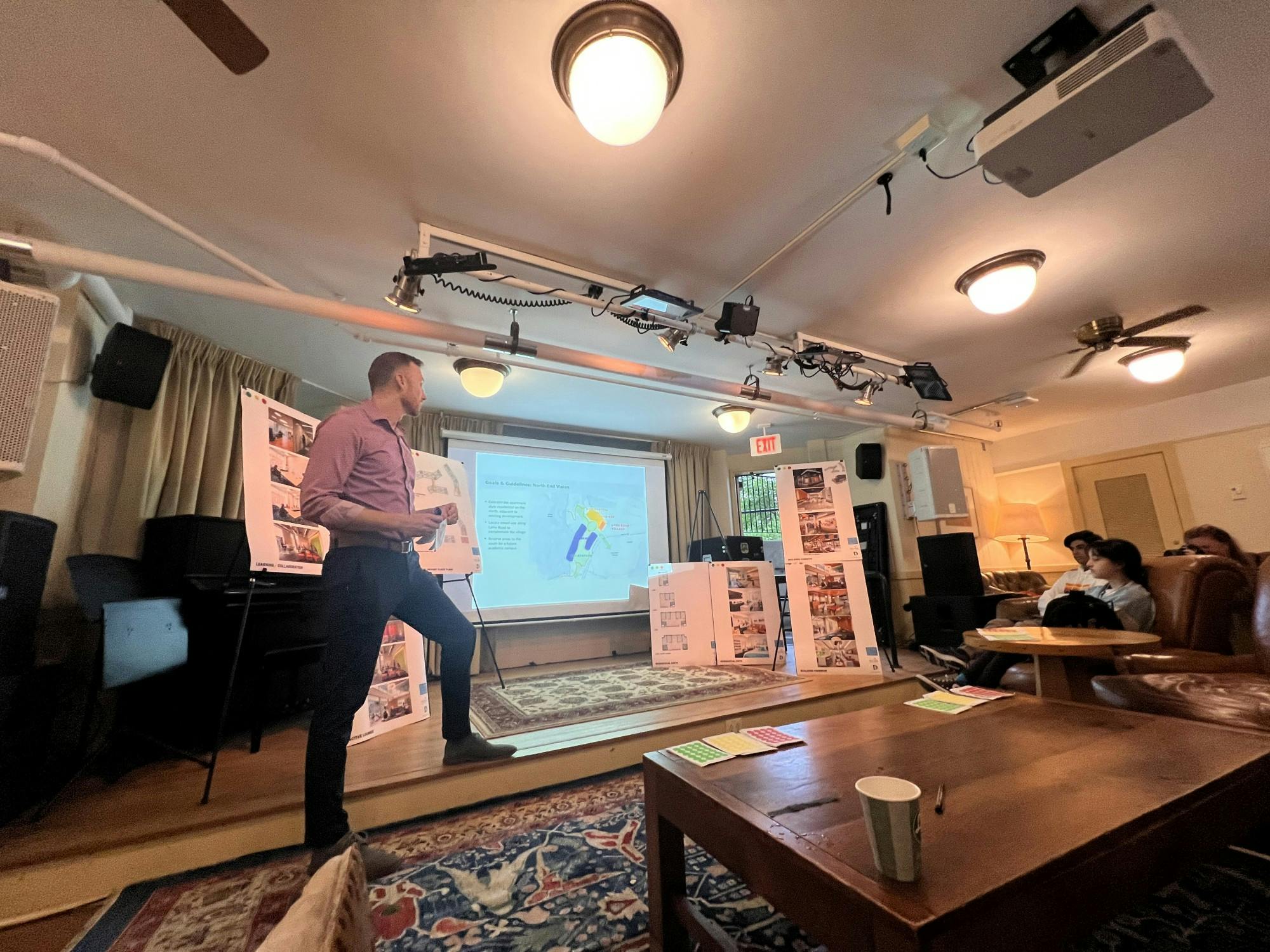Administrators and designers presented the plans for the North End Housing project to about 20 students and Dartmouth community members on Tuesday afternoon. After an initial presentation, some students voiced concerns during a Q&A session about the environmental impact of the development, which is set to be completed by 2025.
According to vice president of campus services and institutional projects Josh Keniston, the finished complex would contain three buildings capable of housing around 400 students and would be located opposite the Co-op on the golf course on Lyme Road. A College press release on Wednesday noted that the complex would be located 1.4 miles north of the Green, accessible to campus by a five-minute shuttle ride.
Interim Dean of the College Scott Brown said that a focus of the College in choosing the new site is preserving Dartmouth’s “profound sense of place,” as well as enhancing the opportunity for student independence.
In his presentation, Keniston said that the College inspected over a dozen possible building sites around campus, with the goal of leaving current housing intact due to the ongoing housing crunch. Keniston added that the North End complex will accommodate students who want a more “independent style” of living, with options like single bedrooms and units with kitchens.
“The site would have to be big enough to support apartment-style housing,” he said.
During the Q&A session, Keniston noted that there has already been strong interest in the Summit on Juniper apartments — an off-campus site in Lebanon originally intended for graduate students — since the College began offering it as a housing alternative in the spring.
“When you are even closer to campus, we suspect [interest] would rise,” he said. “There are a lot of reasons why individuals might want this type of housing: For some they want a kitchen, for some they want that individual bedroom but they don’t want to be disconnected from a friend group.”
Keniston said that although the College expects the “overall cost” of attendance to be the same for students who choose to live in North End housing or typical dormitories, the pricing structure may be different, such as a 10 to 11 month lease instead of paying for a dorm room for each quarter spent in residence.
A number of students pressed College administrators on the environmental impact of the new site. Abigail Wiseman ’22 noted in her question that the College is moving at what she called an “astronomically slow rate” in addressing climate change challenges.
“Sprawling campuses are not sustainable,” she said. “Students are going to drive to campus every day from the parking lot; I don’t think that building on the golf course is a good idea.”
Wiseman also noted that Dartmouth’s faculty were largely against a similar plan presented earlier in the year. In February, faculty voted 89-4 to pause further development of a similar plan to build housing on Lyme Road near the golf course. Many voiced concerns about the impact of the development on the campus’ intellectual dynamic, the undergraduate student experience and the environment.
“The faculty voted against this; this [plan] is not making any concrete difference to what students or faculty members have expressed concern about,” she said.
Keniston responded that while the College agrees that “the most sustainable thing to do is not to build a new building,” the expanding research and housing needs of the institution require such a move.
“We want to make sure that that growth is done responsibly,” he said. “When we are expanding, we are adopting high standards for the performance of the building and minimizing our impact on the globe. It’s a balancing act.”
Student body president David Millman ’23 voiced concern about whether building largely upperclassman off-campus housing would remove a significant number of important campus leaders from the heart of campus.
Keniston did not respond directly to Millman’s concern, but noted that the College hopes that communities of students will “naturally coalesce” in the new North End housing, encouraged by a housing design that invites community building with features like a billiards room or communal snack bar.
Ayers Saint Gross, the architectural firm working with the College on the project, set up a number of theoretical pictures of what spaces within the new complex might look like, including recreational rooms and common spaces. Students were invited to place green, yellow and red stickers on different design images to indicate their preferences after the event.
Jessi Calidonio ’26 said that she came to the event after participating in the social impact first year trip, where she learned about the housing crisis in Hanover.
“I have heard from upperclassmen that housing is not secure,” she said. “I was concerned about that because I don’t think I could afford housing outside of College housing, so I think it is important that more housing is being built.”
In an interview after the event, Wiseman elaborated on her environmental concerns.
“I feel pretty frustrated,” she said. “I have been frustrated over the past couple of years learning about Dartmouth’s progress toward sustainability and how far behind our peers we are.”
Wiseman, who studies energy engineering at the College, noted that the “entire premise” of constructing a new development away from campus “goes against everything” related to sustainable development. She said that she attended several listening sessions last spring to voice her concern about the project.
“The project got paused from the faculty vote; when it came back again this summer I felt that nothing had changed,” she said. “It was being proposed far away from campus in a place a lot of people would drive to, urbanizing an otherwise green space. I don’t understand why we are not building on Mass Lot — those offices [there] could be relocated to other places on campus.”
According to Keniston, the project still awaits a monthslong permitting process before the College can break ground on the new site.




